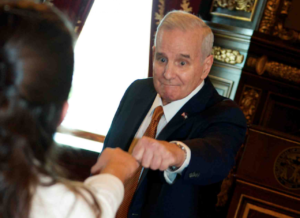Will He or Won’t He? Plastic Bag Ban Now Up to Governor
The ordinance banning plastic bags for many commercial uses in Minneapolis takes effect June 1. So close and yet so far for the environmental special interests determined to make the cost of doing business more expensive for everyone, including consumers. Now it’s all up to Gov. Dayton.
If as expected Dayton signs the jobs and economic development bill on his desk, the plastic bag ban will be stopped. A provision in the bill prohibits local governments from outlawing plastic bags, just in time to stop Minneapolis. But the Star Tribune reports business still have to prepare for the worst, just in case Dayton vetoes the measure.
But for now, stores and consumers are moving forward as if the ban is going to happen. At the entrance to the Target store in downtown Minneapolis, a sign asks customers, “Are you reusable bag ready?” and explains that they’ll get a 5-cent discount for shopping with their own bag when the ban starts. At Lunds & Byerlys, plastic bags are being moved from downtown and Northeast locations to stores outside the city.
“If the city’s ordinance goes into effect, we’re ready and we’ll begin meeting their requirements,” said Lunds & Byerlys spokesman Aaron Sorenson. “And if that ordinance doesn’t go into effect, we’ll follow the state law.”
It should be an easy call for Dayton based on the recommendations of his own state environmental agency. American Experiment’s Peter Nelson recently pointed out that the Minnesota Pollution Control Agency page maintains it’s a myth that paper bags are environmentally superior to plastic bags.
Here’s what they [MPCA] have to say on the plastic versus paper myth:
Conventional wisdom has led many to believe that paper is a more natural product than plastic, thus making it the better choice for the environment. In truth, things are a lot more complicated. Both paper and plastic have big environmental impacts during their life-cycles.
As compared to plastic, paper production actually generates more greenhouse gasses and uses more energy and water, report several studies like this one: Life Cycle Assessment of Grocery Bags in Common Use in the United States.
…The MPCA is basically telling people, if you’re going to use a disposable bag, go ahead and use plastic.
No such luck, however, for companies scrambling to implement paid sick leave policies set to take effect in Minneapolis and St. Paul. MPR notes that Dayton promised to veto another local-preemption bill blocking cities from implementing their own minimum wage, sick leave and other policies that overstep state standards.
During the House debate, Rep. Tony Cornish, R-Vernon Center, said he’s a big believer in preemption.
“This is a good idea, preemption, so we don’t have a patchwork of labor laws in liberal cities like Minneapolis making up things and holding the businesses hostage and making them comply.”
Not much we can add to that.